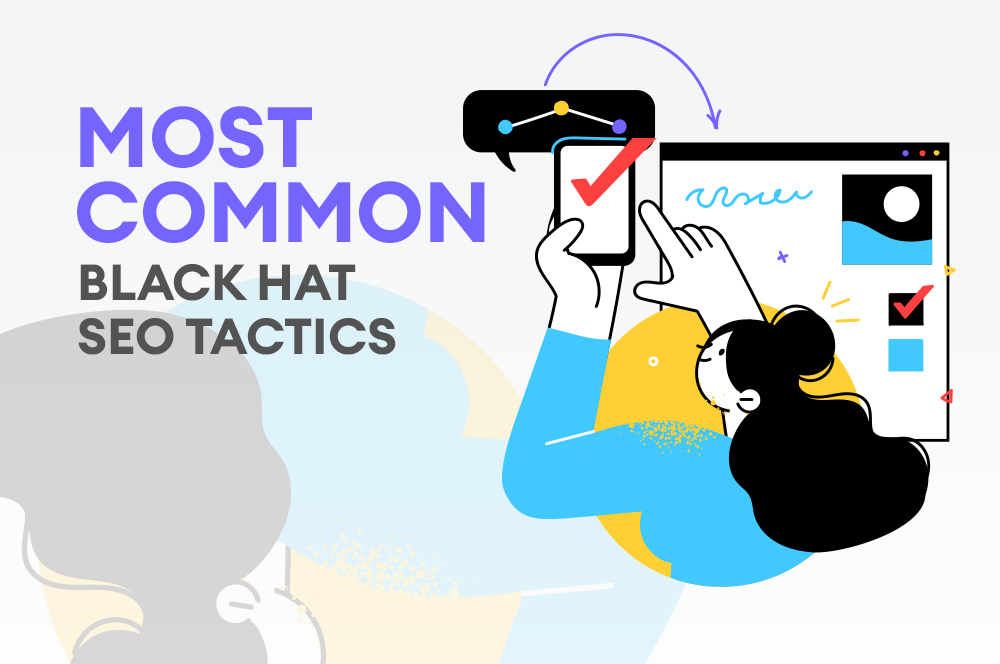What is Most Common Black Hat SEO Tactics?

Many people mistakenly believed that SEO was a deceptive marketing strategy based on 'cheating the algorithm' and using tricks to trick Google into thinking your website was the best result for a search query ten years ago.
This should never have happened, and SEOs should have always focused their efforts on producing the best possible result on the web, not just making it appear so.
However, Google's algorithms were still in their infancy at the time, particularly when it came to detecting webspam.
Many marketers used black hat SEO tactics to rank websites in the past, but that is no longer the case. In this guide, we'll go over which techniques to avoid if you don't want to get in trouble with the algorithm or the Webmaster Quality Guidelines.
What is black hat SEO?
Black hat SEO is a term that refers to techniques that are used to rank a website in violation of search engine guidelines. Black hat SEO techniques attempt to manipulate search engine algorithms in order to boost a website's SERP rankings.
Search engines, such as Google, Yahoo and Bing, make it crystal clear which practices are prohibited. They're also very clear about the consequences of breaking their rules. Using black hat SEO tactics can result in your website being penalized (either algorithmically or manually), resulting in lower search engine rankings and, most likely, a decrease in organic traffic.
What are black hat SEO tactics?
Ranking high in the SERPs (search engine result pages) is beneficial to your business because it opens up numerous opportunities for expansion. However, if you employ the incorrect techniques, you risk destroying your search engine ranking.
Black hat SEO techniques may appear to be a quick fix, but you'll earn the wrath of search engines like Google, Yandex, and Bing — and your rankings will plummet even faster.
Black hat SEO techniques are a bad way to go about optimizing your website for search engines (SEO). Your SERP ranking will suffer as a result of the negative SEO impact. White hat SEO, on the other hand, is more ethical and will improve your website's ranking.
Read on to learn about the differences between white hat and black hat SEO techniques, as well as the bad SEO practices to avoid on your website.
What's the Difference Between White Hat and Black Hat SEO?
Black hat SEO techniques do not align with search engine algorithms, so they should be avoided at all costs.
White hat SEO complies with the guidelines of search engines and improves your search engine ranking ethically. The strategies are aimed at improving your website's SERP ranking while also providing an excellent user experience for human website visitors.
Black hat SEO methods, on the other hand, do not adhere to the terms of the search engine companies. Instead, they manipulate search engine results to achieve higher rankings.
This can result in a penalty or complete removal from search results pages.
You Should Avoid These SEO Mistakes
- Duplicate content on a Website
Duplicate content is a black hat SEO method that can cause your website's ranking to plummet. Duplicate content should be avoided, according to Google. It is considered plagiarism and poor website design by search engines.
Non-unique items will be ignored by search engines as they crawl your website for content to index.
Make certain that neither your blog posts nor the content of others is duplicated. If you have to use existing media on a new web page, make sure the page is set to "noindex" and "nofollow" to avoid harming your website's SEO.
The best practice, however, is to follow search engine guidelines and create unique, original content to boost your page's ranking.
- SEO Keyword Stuffing
Keyword stuffing is when you use a specific keyword multiple times in the body of your copy, even if it isn't relevant. When you want to optimize that post for search engines, this seems like a good idea.
However, prioritizing keyword density overwriting for humans is a black hat SEO strategy that will quickly degrade your content rankings.
Keyword stuffing will also make your audience lose interest in your content because it appears as if you're writing in a language that only bots understand.
In the same way, stuffing irrelevant keywords into your blog posts signals to search engines that you're attempting to deceive the algorithm into ranking your content higher in the SERPs. This may result in a Google penalty.
Mentioning your keywords is a white hat SEO technique that can be used ethically. However, you should go about it in a natural manner.
Place keywords in strategic locations, such as:
• The title of the article or blog post
• Meta description
• Meta information
• Introduction
• Subheadings
Your keywords should appear several times in the body of the text, but make sure they flow well and make sense in context.
- Guest Posts of Poor Quality
Guest posting is an excellent way to improve SEO, but it can backfire if done incorrectly.
It's a good SEO habit to update your website with new content from guest authors and bloggers on a regular basis. However, you must make certain that these posts are unique, valuable, and of high quality.
You can publish content written by others and feature new writers on your website as long as you check for plagiarism. Also, don't include any work that isn't relevant to your target audience.
Make sure there aren't any links to bad websites with irrelevant or low-quality content. Linking to suspicious, spam-filled blog networks may result in a penalty, even if your website contains valuable content.
- Above-the-Fold Ads in Excess
The part of a web page that users see before they start scrolling is known as above-the-fold. In this area, Google penalizes websites that have too many ads. It's a bad SEO technique, according to search engine guidelines, because it creates a bad user experience.
When a website fails to meet Google's page layout algorithm, it risks losing a significant amount of organic traffic. - Links with a Fee
Paid links are link schemes that entail purchasing links in a blog post slot or directory, usually on authoritative websites. Obtaining high-quality backlinks from authoritative pages can help your website's SEO.
Earning legitimate backlinks takes time, effort, dedication, and connections, but the payoff is well worth it.
If you try to cheat your way to the top of the SERPs by buying links, you might get a Google penalty quickly.
Because Google strongly disapproves of paid links, this black hat SEO technique can completely stifle your website's growth.
- Cloaking
Cloaking is the deliberate display of different content to visitors and search engines on your website.
Cloaking is a technique used by some websites to conceal:
• Links that are spammy
• Subtle redirections
• Malicious computer software
• Excessive advertising
• Content created by machines
These websites try to deceive search crawlers in order to rank higher in the SERPs by breaking search engine rules. This black hat SEO tactic also aims to deceive Google's algorithm so that a website can rank for a number of keywords that are unrelated to its content.
- Headlines that entice you to click
Several webmasters use deceptive headlines to increase clickthrough rates. These "clickbait headlines" usually lead to low-quality content that hurts your SEO.
Make compelling but honest headlines that promise value by the end of the post to your readers.
When visitors realize they've been duped, clickbait headlines result in a high bounce rate. If your fake headlines consistently violate search engine guidelines, you may face a penalty.
- Farming with Links
Websites or directories that provide opportunities for link building are known as link farms. Link farming is another black hat SEO technique that inflates a website's backlink count in order to improve its SERP ranking.
These outgoing links are usually low-quality and contain anchor texts that contain keywords that a website wants to rank for.
Google detects link farms quickly and penalizes websites that employ this tactic. If you "nofollow" links in comments, ads, or websites that you believe are untrustworthy, you can avoid a search engine penalty.
- Websites that are slow or unavailable
Hosting your website on low-quality servers isn't necessarily a bad SEO strategy, but it can have a negative impact on your search engine ranking.
People will avoid or bounce from your website if it is slow or unavailable. This tells Google that your site isn't worth ranking because the visitors aren't interested.
The average website's load time should be 2-3 seconds or less, and it should be available at all times, according to search engine specifications. As a result, it's critical to work with a reputable hosting company to create a fast website on dedicated servers that can be accessed at any time.
Black hat SEO techniques can devastate your website's SERP ranking. To improve your blog's SEO, rank higher on Google's search engine results page, and meet your goals, use white hat SEO techniques in your content marketing.
High-quality content, strong backlinks from relevant guest posts on high-domain-authority platforms, and a fast, dependable website are the best SEO methods.
How to fight back black hat SEO?
Focus on white hat SEO tactics and avoid the following black hat SEO methods to avoid displeasing both search engines and users.
- Publishing a slew of low-quality content
- Keyword stuffing and content duplication
- Cloaking
- Using Deceptive Redirects
- Purchasing backlinks
- Using Private Blog Networks and Link Farms
Share on
Similar topics:
Similar blogs

SEO Evolution: Adapting to Search Engine Algorithms

SEO Decoded: From Algorithms to Page Rankings
Grow Your Referral and Organic Traffic
Choose a style, use sections to build pages and lastly, add your copy. It only takes a few clicks toget your site ready to go.